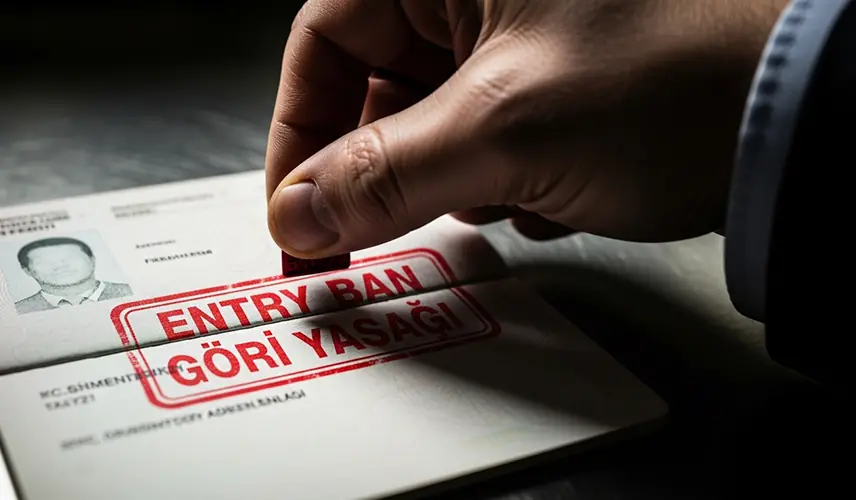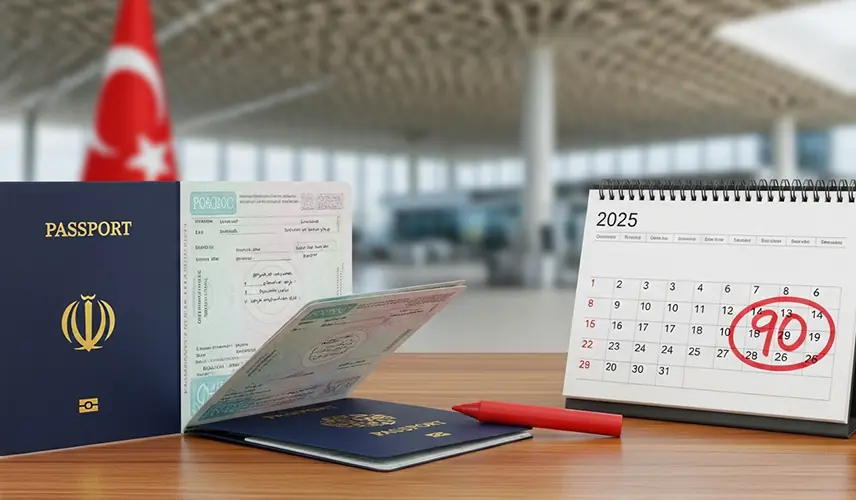In 2025, Turkey continues to apply the Soil Law ("Hak-i Arz" or overstay regulation), outlining specific rules regarding how long Iranian citizens can legally stay in the country without a visa. According to this regulation, Iranian nationals are allowed to stay in Turkey for up to 90 days within any 180-day period without requiring a visa.
In this article from Ista Property, we will discuss the Turkish Land Rights Law and how it will be paid in 2025.
If an Iranian visitor stays beyond this 90-day limit, they are subject to an overstay fine (overstay penalty). Furthermore, after overstaying, they will be prohibited from re-entering Turkey for at least 90 days from the date of departure. These fines must be paid in Turkish Lira (TRY) at a tax office (Vergi Dairesi) or exit points such as airports. The purpose of these penalties is to encourage lawful stays and discourage extended, unauthorized residence.
What Is the “Soil Law” in Turkey?
Turkey is a favored destination for Iranians due to cultural similarities, close geographical proximity, and relatively low travel costs. One of the major advantages for Iranians is that they do not need a visa for short visits, which eliminates the hassle and expense of visa applications.
However, under the Soil Law of 2025, Iranian travelers are required to leave Turkey within 90 days of their entry. If they fail to do so, they must pay a fine based on the length of their overstay and will be temporarily banned from re-entering the country.
This rule is part of a broader regulation that allows foreigners, including Iranians, to stay in Turkey for a maximum of 90 days within a 180-day rolling period. Anyone intending to remain beyond this duration must either obtain a residency permit or pay the required overstay fine.
How Much Is the Overstay Fine in Turkey (2025)?
Many people choose to stay in Turkey for extended periods due to business, tourism, or family reasons, but they may not be aware of the overstay penalties.
As of the most recent data, the overstay fine in Turkey is structured as follows:
For Individuals Over 18 Years Old:
-
1st Month: $50 USD
-
2nd Month: $60 USD
-
Each Subsequent Month: +$10 USD
-
12th Month: $120 USD
Even overstaying by a single day beyond the 90-day limit requires payment of the full first-month penalty.
For Individuals Under 18 Years Old:
-
1st Month: $25 USD
-
Each Additional Month: +$10 USD
Please note: These values are approximate and converted into Turkish Lira at the time of payment. Additional administrative fees may also apply, which could slightly raise the total payable amount.
Why Are Overstay Fines Charged?
According to Turkey’s Soil Law 2025, any foreign national who remains in the country beyond the permitted visa-free duration (90 days) without obtaining a residency permit will face a financial penalty. The regulation also imposes a 90-day re-entry ban on anyone who overstays and fails to settle their penalty.
How to Pay the Overstay Fine in Turkey

The overstay fine must be paid in Turkish Lira (TRY) and can typically be settled at:
-
Local Tax Offices (Vergi Dairesi)
-
Airport Exit Points
-
Online Platforms (if available for your case)
Steps to Pay the Fine or Land Tax:
-
Select Your Payment Method:
Bank transfer to a local municipality account
In-person at a tax office or city hal
Online (on official municipal websites)
Gather Required Documents:
Passport
Tax Identification Number (Vergi Kimlik Numarası) – required for foreigners
-
Calculate the Amount Due:
Confirm property or overstay fines with local authorities
Be aware of any late payment penalties or currency conversion fees
-
Make the Payment:
Preferably before your departure
Retain the official payment receipt
-
Seek Assistance:
Contact a local real estate consultant, lawyer, or financial advisor if needed
What Happens If You Don’t Pay the Overstay Fine?

Failure to pay the overstay fine can result in:
-
Entry ban to Turkey for a period determined by Turkish authorities (typically 90 days or longer)
-
Denial of future visa or residence permit applications
-
Problems at Turkish border control
Conclusion
The Soil Law in Turkey sets clear rules for Iranian travelers, allowing them to stay in the country without a visa for up to 90 days within a 180-day period. Overstaying leads to fines and temporary entry bans. It’s essential for travelers to monitor their stay duration, calculate potential fines if overstaying, and make timely payments to avoid legal issues. For detailed guidance, travelers are encouraged to consult with legal advisors or contact agencies like Esta Property, which specializes in immigration and travel-related assistance in Turkey.

 USD
USD
 TRY
TRY
 EUR
EUR
 IRR
IRR
 RUB
RUB

Comments